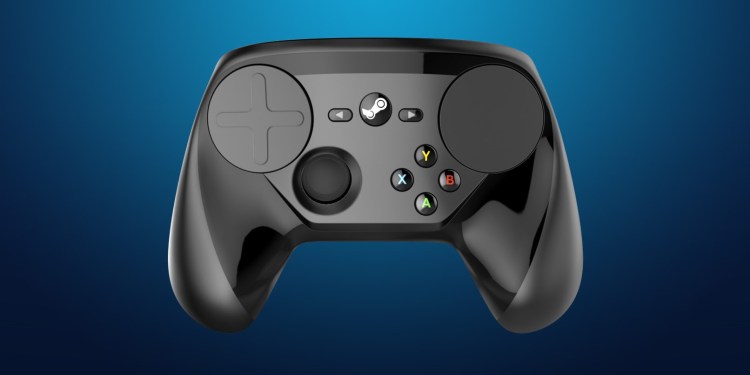Valve is getting into the hardware business — and you can’t make video game hardware without having your own controller.
We’ve reached a point of near standardization of the gamepad. Everything is basically just a riff on the Xbox 360 controller we’ve used for years, and that’s one of the reasons Valve’s Steam Controller is so damn strange. So if you drop the $50 to pick up one of these input devices, you need to have no expectations that it’s going to work like other popular controllers.
Steam’s gamepad has no real D-pad. It only possesses a single analog stick. It does feature two circular trackpads that can act as virtual sticks.
It’s crazy — and even after a few weeks with it, I’m still not really used to it.
What you’ll like
It’s different
Valve is in a weird position with the Steam Controller. It knows that if you want a gamepad for your PC, Steam Machine, or Steam Link, you can’t go wrong with the DualShock 4, Xbox One, or Xbox 360 controllers. So instead of producing another me-too product, the Steam Controller flies boldly in another direction.
The big change here are the two touchpads. I’ve used similar Valve tech with the HTC Vive, and I know they’re capable of empowering very interesting mechanics. The truth is that the Valve controller can do things the other devices simply cannot. And that’s exciting even if it’s mostly unfulfilled potential at this point.
It work well with games that have no business working with a controller
The Steam Controller was always pitched as Valve creating a couch-friendly input device for mouse-and-keyboard games. That’s something two analog sticks have never handled well.
Unsurprisingly, the Steam Controller doesn’t fall short here. I know because I accidentally ended up playing Civilization V for way longer than I intended to after booting it up on my Steam Link. I don’t know if I really need to play Civ on my couch, but I now know that the control input is no longer a barrier to doing so.
What you won’t like
It requires you to relearn too much
I’m 32. This means I have aged alongside the video game controller. I learned to first play on the Nintendo Entertainment System’s D-pad and two-button configuration. As my hands became more capable and I learned better manual dexterity, hardware manufacturers added more complexity to their pads. Shoulder buttons with the Super Nintendo. The analog stick on the Nintendo 64. The right analog stick with the PlayStation’s DualShock and secondary shoulder buttons.
What you notice, if you look back at that technological progression, is that each new controller built on top of the last. Nintendo didn’t remove the D-pad to add the analog stick, for example.
But Valve, to include its two thumbpads, has removed the right analog stick and moved the face buttons way down and to the left.
I am not compatible with all of this change, and I think you’ll need time to grow accustomed to it as well. I tried all kinds of big games — Skyrim, The Witcher, Far Cry, and Fallout 4 — and I don’t see how I could ever get this pad to work in a way that I would find acceptable.
I understand that other people said that it has clicked for them — it hasn’t for me. Maybe it will, but I think it’s hard to feel good about any controller with a harsh learning curve.
It feels cheap
This does not feel like a premium piece of equipment. Its plastics feel hollow — like a toy you’d get out of a cereal box. The shoulder buttons are mushy. The Steam button’s click has no oomph until the haptic feedback kicks in. It is $15 less expensive than a DualShock 4 or Xbox One controller, but it also feels way cheaper than either (at least the latest revisions of those peripherals).
Now, it doesn’t exactly feel like a $20 third-party Nintendo 64 controller you would have bought from Blockbuster. Its analog stick (it’s weird to use the singular of that term) and haptic feedback both have a good feel. But we’re at a point where everything we own is so precisely engineered that it’s disappointing when every aspect of a product doesn’t come together.
Nothing uses its most interesting features
Yes — the Steam Controller is different, but it’s a distinction without a purpose. The touchpads and rumble feedback are so damn interesting. For example, if you slide your finger across the right thumbpad like it’s a track ball, the haptic motor will continue to rumble afterward as if it is continuing the momentum of your swipe.
It’s a unique sensation, and I bet you won’t even notice it because I couldn’t find any games that take advantage of it.
Maybe this isn’t a problem with the controller itself. It’s not this thing’s fault that Valve hasn’t built a game to take advantage of it. But it is certainly a problem for anyone thinking about buying it.
Conclusion
Unless you have a terrible need to play keyboard-and-mouse games on your television, I’d recommend waiting before buying the Steam Controller.
Microsoft and Sony make better controllers for most kinds of games, and they both work just fine with your PC — and the DualShock 4 will even connect wirelessly over Bluetooth with a Steam Link or Steam Machine without any extra dongles. If Valve or other developers step up with games that make more sense for this controller, then maybe it will make sense. But not yet.
Valve provided GamesBeat with the Steam Controller for the purpose of this review.
VentureBeat's mission is to be a digital town square for technical decision-makers to gain knowledge about transformative enterprise technology and transact. Learn More

